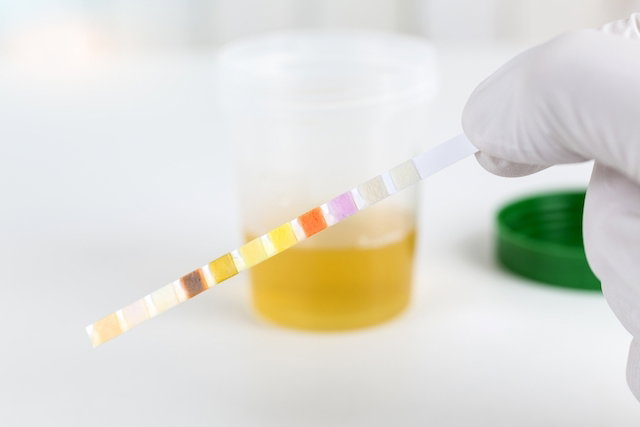The presence of protein in the urine during pregnancy is a common and normal change, which is normally related to the increased work of the kidneys to filter excess fluids in this new phase of the woman’s life.
However, when the amount of protein in the urine is very high, generally above 300 mg per day, it can mean some health problems, such as urinary tract infection, dehydration or even pre-eclampsia.
Therefore, all blood or urine tests carried out by the pregnant woman must always be evaluated by the obstetrician to identify whether it is necessary to carry out other tests in order to diagnose possible health problems and initiate early treatment.

Main causes
Some of the most common causes of excess protein in the urine are:
1. Excessive stress
Pregnancy is a period of many changes and adaptations in the pregnant woman’s life and, therefore, the level of stress can be very high. Generally, increased stress causes an increase in the body’s functioning, which also translates into increased filtration in the kidneys.
Thus, it is common for protein to appear in the urine test, however, this change is temporary and disappears within a few days, without affecting the health of the pregnant woman or the baby.
What to do: To relieve stress during pregnancy, it is important to adopt some strategies, such as regular exercise, doing activities you enjoy, eating healthy and resting. This way, it is possible to reduce the amount of protein in the urine, as well as enjoy your pregnancy.
2. Urinary tract infection
The existence of a urinary infection is one of the main causes of proteinuria, occurring due to the presence of bacteria. In these cases, it is possible to have other signs such as increased urination frequency, a feeling of heaviness in the bladder or discomfort when urinating, for example.
Although a urinary tract infection does not directly affect the baby, it needs to be treated quickly to avoid other complications such as premature birth or reduced birth weight.
What to do: Treatment for urinary tract infections during pregnancy involves the use of antibiotics, which must be prescribed by the gynecologist and used as recommended, as some antibiotics are not recommended during pregnancy and can have consequences for the baby’s health. The most recommended antibiotics for treating urinary tract infections during pregnancy are cephalexin or ampicillin, which are normally indicated for 7 to 14 days. Find out more about treating urinary tract infections during pregnancy.
Taking care of your health has never been easier!
3. Dehydration
Dehydration can appear at any stage of pregnancy, due to not drinking enough water during the day, days with very high temperatures or an increase in body temperature, leading to loss of water and mineral salts, which can interfere with the way the kidneys reabsorb water. proteins, which are eliminated in greater quantities in the urine.
Furthermore, dehydration can also arise due to morning sickness, hyperemesis gravidarum, diarrhea or even kidney failure, and be accompanied by other symptoms, such as dizziness, excessive thirst, dry mouth, intense headache and tiredness.
What to do: wear loose clothing to alleviate the discomfort caused by excessive heat and reduce sweat production, and stay hydrated by drinking around 8 to 10 glasses of water a day, as this way you can avoid dehydration. In more serious cases of dehydration, hospitalization may be necessary to receive intravenous serum and other medications.
4. Pre-eclampsia
Pre-eclampsia is a serious complication of pregnancy, characterized by high blood pressure, rapid weight gain and high blood pressure during pregnancy, which must be identified as soon as possible to avoid health problems in pregnant women. In these cases, excess protein appears after the 2nd trimester of pregnancy and is associated with other changes such as increased blood pressure, headache or swelling in the body.
When pre-eclampsia is suspected, it is important to repeat the urine test and consult an obstetrician to assess blood pressure.
What to do: In cases of high blood pressure during pregnancy, it is recommended that women rest during the day and drink plenty of fluids, in addition to maintaining a balanced diet low in salt and processed foods. Furthermore, it is recommended to practice light physical activities, such as walking, Yoga or water aerobics, for example. See how high blood pressure is treated during pregnancy.
Can protein in urine indicate pregnancy?
Although pregnancy causes an increase in the amount of protein in the urine, this change is not always a sign of pregnancy. This happens because several health problems can cause the same change:
- Problems in the functioning of the kidneys;
- Diabetes;
- Heart diseases;
- High pressure;
- Urinary infection.
Therefore, when the urine test indicates the presence of protein, it is important to consult your general practitioner to assess the need for other tests to help determine if there is a health problem that needs to be treated.
Understand the meaning of different changes in the blood test.

Sign up for our newsletter and stay up to date with exclusive news
that can transform your routine!
Warning: Undefined array key "title" in /home/storelat/public_html/wp-content/plugins/link-whisper-premium/templates/frontend/related-posts.php on line 12
Warning: Undefined array key "title_tag" in /home/storelat/public_html/wp-content/plugins/link-whisper-premium/templates/frontend/related-posts.php on line 13



